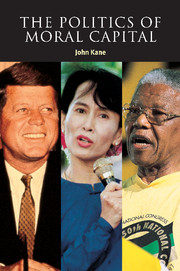Book contents
8 - Crisis
Published online by Cambridge University Press: 22 September 2009
Summary
Wicked people bring a like quality to their positions of honor, and stain them with their infection.
Boethius, The Consolation of PhilosophyThe legacy of John Fitzgerald Kennedy has been the subject of massive scholarship and disagreement, but in this chapter I want to draw attention to three principal parts of it that played central, and interconnected, roles in the American loss of moral capital: one was the symbolic legacy of continuity and connection with the martyred president; the second was the legacy of the assassination itself and the general suspicion it aroused; and the third was the political legacy of reform at home combined with anti-communist action abroad, most crucially in Vietnam.
The symbolic legacy
One aspect of the symbolic legacy was the astonishingly enduring hope for a rebirth of that shining moment of Camelot in the person of another Kennedy, a hope that, though dwindling, was not wholly extinguished until the death of JFK Jr. in a plane crash in 1999. (It was a hope that showed once again the potential transmissibility of certain forms of moral capital to bona fide inheritors.) But the symbolic legacy also affected Kennedy's successors and their views of the possible role and purposes of the presidency itself.
- Type
- Chapter
- Information
- The Politics of Moral Capital , pp. 200 - 217Publisher: Cambridge University PressPrint publication year: 2001

